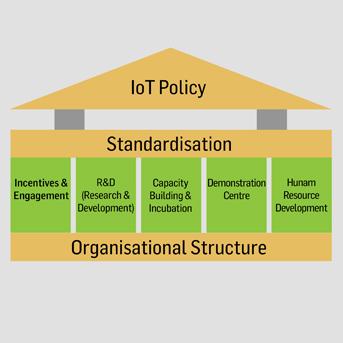
The draft Internet of Things (IoT) policy released by DeitY (Department of Electronics and Information Technology) aims at IoT driven consumer and business actions based on intelligent industry solutions. Further, the launch of the Digital India Program & Smart City concept of the government focuses on ‘transforming India into digital empowered society and knowledge economy’.
The objective is to create an IoT industry worth $15 billion by 2020. This will see an increase in the connected devices from around 200 million to over 2.7 billion by 2020. Also, the proposed policy is aligned with the government's plan to develop 100 smart cities in the country, for which Rs. 7,060 crores have already been earmarked in this year’s budget.
Focus is on developing IoT products precisely to our needs in the sphere of agriculture, health, water quality, transportation, security, automobile, automated metering and monitoring of utilities, waste management and many others.
Structure of the IoT Policy has been planned to be implemented through a multi-pillar approach. It will have five vertical pillars (Demonstration Centres, Capacity Building & Incubation, R&D (Research and Development) and Incentives and Engagements, Human Resource Development) and 2 horizontal supports (Standardisation & Organisational structure).
Demonstration Centres
A domain specific approach would be taken for IoT together with green building, smart grid, industrial monitoring, smart cities, healthcare, telematics and supply chain, and safety and security.
Concurrently, it has been recommended that Rs. 125 Crores would be allocated on PPP (Public Private Partnership) mode as 50 per cent funding for at least 5 projects over a period of 3 years. Further, it would be identified which specific applications/ prototypes are of highest priority and comprehensively beneficial.
Capacity building & Incubation
Education and Research Network (ERNET) would be the chief agency handling the capacity building operations in tandem with 15 academic/institutional players. Resource Centers & Test-beds will be established as a common experimental area for testing various IoT devices and applications.
In addition to this, Incubation centres (National Centre of Excellence) would be set up under PPP arrangement with NASSCOM (National Association of Software and Services Companies) and other industry associations for expansion of IoT industry.
Research and Development (R&D)
The core members of the R&D team would be identified depending on the specific technology in relation to IoT needs. Open sourced projects under the ambit of cloud based architecture would be taken up with persistent and collaborative R&D approach. Various test laboratories for hardware to hardware (H to H) and hardware to software (H to S) integration will be formed.
On the other hand, to encourage private sector investment in R&D, DeitY plans to form International IoT Research Collaboration scheme (IIRC), which will initiate partnerships with other countries to generate joint projects for R&D on 50 per cent contribution basis.
Incentives & Engagements
The draft policy proposes that the capital goods or raw materials imported for manufacturing IoT products in the country be duty free up-to 100 per cent. Venture funds would be encouraged under Electronic Development Fund aimed at companies who are in IoT related domains like memory, processor, sensors, low power devices, solar electronics etc.
Human Resource Development
The policy has recommended introduction of IoT based curriculum in B.Tech and M.Tech courses, along with introduction of research programs in this field. Further, certificate course of two or six weeks duration in IoT training have also been suggested.
Standardisation
The appropriate nodal agency will be chosen for driving and formalizing standards relating to technology, course of action, interoperability and services in IoT architecture.
This will include spectrum energy communication protocols, international quality/integrity standards for data creation & traceability, and privacy and security parameters. Additionally, a national expert committee will also be created for developing and adopting IoT standards in the country.
Organisational Structure
A high level advisory committee would be set up which will include representatives from government, industry and academia to give direction and guidance in the emerging areas of IoT.
Also, a Program Management Unit (PMU) will be established under Director (IoT operations & Smart City support), which will provide continuous support in identification of copious initiatives for operationalisation of the IoT policy.
In all, the draft policy points out that the success to IoT would be in creating open platforms at affordable cost and utility, developing scalable models and using citizens as sensors. The policy is currently open for suggestion and comments with no specific deadline been given.

 In
In
Add new comment